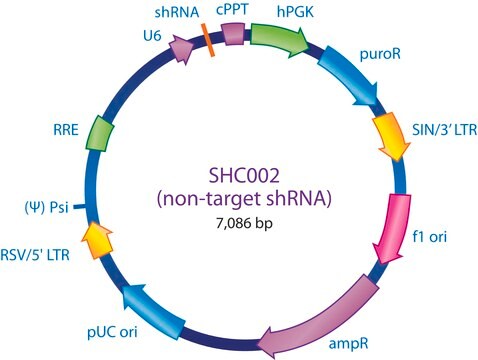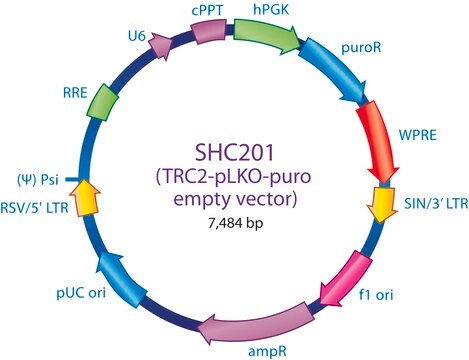SHC312V
MISSION® 1X LacO Inducible Non-Target shRNA Control Transduction Particles
Does not target any known genes
Iniciar sesiónpara Ver la Fijación de precios por contrato y de la organización
About This Item
UNSPSC Code:
41106609
NACRES:
NA.51
Productos recomendados
Quality Level
product line
MISSION®
concentration
≥1x106 VP/ml (via p24 assay)
shipped in
dry ice
storage temp.
−70°C
General description
Sigma® is proud to offer IPTG-inducible vectors as the latest development from our continued partnership in TRC.
The pLKO vector has been redesigned to contain a LacI (repressor) and a modified human U6 shRNA promoter with LacO (operator) sequences. In the absence of IPTG (isopropyl-Β-D-thio-galactoside), an analogue of lactose, LacI binds to LacO preventing expression of the shRNA. When IPTG is present, the allosteric LacI repressor changes conformation, releasing itself from lacO modified human U6 promoter, and subsequently allows expression of the shRNA.
The MISSION 1x LacO Inducible Non-Target shRNA Control Transduction Particles contain an shRNA insert that does not target any known genes, making it useful as a negative control in experiments using the MISSION inducible shRNA library clones. This allows one to examine the effect of transfection of a short-hairpin on gene expression and interpret the knockdown effect seen with shRNA clones. Ampicillin and puromycin antibiotic resistance genes provide selection in bacterial or mammalian cells respectively. In addition, self-inactivating replication incompetent viral particles can be produced in packaging cells (HEK293T) by co-transfection with compatible packaging plasmids. 200uL of 106 TU/ml (via p24 titering assay) lentiviral particles are provided as frozen stock.
When conducting experiments using MISSION® shRNA clones, the proper controls should be a key element of your experimental design to allow for accurate interpretation of knockdown results.
The pLKO vector has been redesigned to contain a LacI (repressor) and a modified human U6 shRNA promoter with LacO (operator) sequences. In the absence of IPTG (isopropyl-Β-D-thio-galactoside), an analogue of lactose, LacI binds to LacO preventing expression of the shRNA. When IPTG is present, the allosteric LacI repressor changes conformation, releasing itself from lacO modified human U6 promoter, and subsequently allows expression of the shRNA.
The MISSION 1x LacO Inducible Non-Target shRNA Control Transduction Particles contain an shRNA insert that does not target any known genes, making it useful as a negative control in experiments using the MISSION inducible shRNA library clones. This allows one to examine the effect of transfection of a short-hairpin on gene expression and interpret the knockdown effect seen with shRNA clones. Ampicillin and puromycin antibiotic resistance genes provide selection in bacterial or mammalian cells respectively. In addition, self-inactivating replication incompetent viral particles can be produced in packaging cells (HEK293T) by co-transfection with compatible packaging plasmids. 200uL of 106 TU/ml (via p24 titering assay) lentiviral particles are provided as frozen stock.
When conducting experiments using MISSION® shRNA clones, the proper controls should be a key element of your experimental design to allow for accurate interpretation of knockdown results.
Application
To see more application data, protocols, vector maps visit sigma.com/shrna.
Legal Information
MISSION is a registered trademark of Merck KGaA, Darmstadt, Germany
Sigma is a registered trademark of Sigma-Aldrich Co. LLC
¿No encuentra el producto adecuado?
Pruebe nuestro Herramienta de selección de productos.
Optional
Referencia del producto
Descripción
Precios
Storage Class
12 - Non Combustible Liquids
wgk_germany
WGK 3
flash_point_f
Not applicable
flash_point_c
Not applicable
Elija entre una de las versiones más recientes:
Certificados de análisis (COA)
Lot/Batch Number
Lo sentimos, en este momento no disponemos de COAs para este producto en línea.
Si necesita más asistencia, póngase en contacto con Atención al cliente
¿Ya tiene este producto?
Encuentre la documentación para los productos que ha comprado recientemente en la Biblioteca de documentos.
Nuestro equipo de científicos tiene experiencia en todas las áreas de investigación: Ciencias de la vida, Ciencia de los materiales, Síntesis química, Cromatografía, Analítica y muchas otras.
Póngase en contacto con el Servicio técnico






